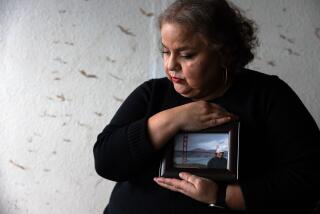Suitcase Death Victim Failed to Gain a Visa
- Share via
The young Iranian bride whose body was found inside a suitcase on a luggage carrousel at Los Angeles International Airport had been turned down for a tourist visa to the United States four days before she died, U.S. officials said Monday.
Her husband, Mahmoud Ayazi, 31, who had evidently tried to smuggle her into the country, committed suicide outside his Sacramento apartment Thursday, three days after learning that his bride had died inside the small suitcase at the end of a nearly 11-hour flight from Germany.
Purpose of Interview State Department officials said this week that Kataun Safaie, 20, had mentioned “honeymoon” as one reason for her desired visit when she was interviewed by an official at the U.S. Consulate in Frankfurt, West Germany. She and Ayazi, a Sacramento electrician and university graduate who moved to the United States eight years ago to study, had flown to Germany after their wedding in Iran three weeks ago.
“She applied for a tourist visa and was refused because the officer was not convinced she was not an impending immigrant,” said Richard Weeks, spokesman for the State Department’s consular affairs division. He added that such interviews for visas are “more the rule than the exception” for foreigners wishing to visit the United States.
In other words, consular officials felt they had reason to believe that if she were given a tourist visa, Safaie might do what some tourists do on visits to the United States--”overstay” their visas and take up residence, which is a violation of immigration law. The “overstay” visitor circumvents immigration waiting lists which often result in delays of several years.
“I could only point out in general terms,” Weeks added, “that when a person is interviewed for a non-immigrant visa, the consular officer looks at all connections with the foreign country (to be visited), in order to assure himself the person indeed intends to return (home). Such connections include financial ties, social, cultural, religious ties, and family ties,” like marriage.
Weeks said that when a person is refused a tourist visa, officials usually mention alternate types of visas.
Sacramento friends of Ayazi’s said the newlywed couple had evidently come up with the desperate plan to get Safaie into this country after learning that she would have to wait up to a year to enter the country legally, as a “second preference” immigrant--the wife of a U.S. permanent resident alien, a “green card” holder, which Ayazi was.
Ayazi’s own green card allowed him to enter and leave the United States without a separate visa, Weeks said.
More to Read
Sign up for Essential California
The most important California stories and recommendations in your inbox every morning.
You may occasionally receive promotional content from the Los Angeles Times.














